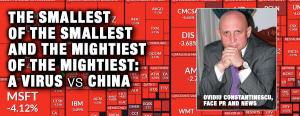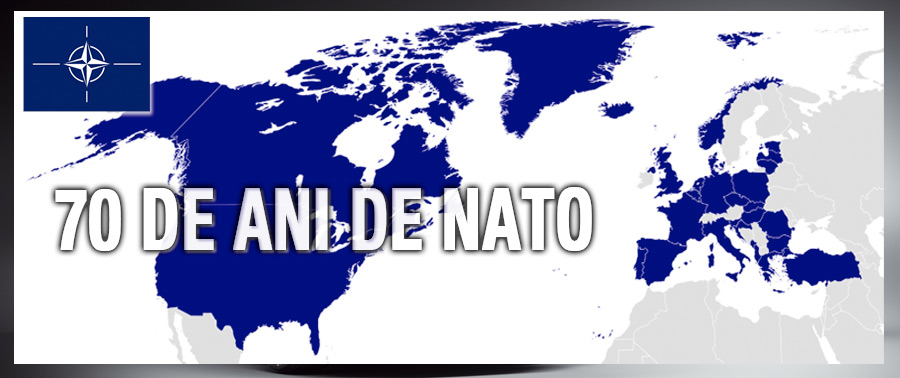The smallest of the smallest and the mightiest of the mightiest: a Virus vs China
If you pay less for your gas at the filling station these days there is no reason to be happy. On the contrary, you should be worried. Very very worried, in fact. Those inconspicuous digits that one sees at the pump are far more accurate in predicting the ups and downs of the world economy, and the Romanian economy for that matter, than any TV pundit.February
When the US took out the head of Iran’s security services, up it went for a day or two, then it calmed itself down, signaling that there will be no war between the two states and the confrontation will not go beyond a certain limit, thus not putting pressure on the world oil supply. The main stock exchanges, from Tokyo to New York, breathe a sigh of relief that the economy will continue to run smoothly.
But, for the past few weeks, there has been a sense of nervousness on the oil market and on stock exchanges. The Brent and the WTI benchmarks are going down. Steep and steady. At some point, WTI went, breifly, below the 50$/barrel level before bouncing back slightly. That signals that the world doesn’t need so much oil, at least for the foreseeable future. The reason for it is that the mighty China is about to be brought to its knees by the smallest of the smallest living creatures. The fact that the Chinese authorities have taken unprecedented measures to contain the virus and seal off a 14-million-people city, building in a blink of an eye two hospitals exclusively for people infected with what has become the Wuhan pneumonia or the Wuhan coronavirus, shows the kind of nervousness that we have not seen even during the SARS outbreak, 15 years ago.Bit by bit, China is cut off from the rest of the world and “quarantined”. By the way, if you didn’t know, the word “quarantine” had to do with shipping goods and international commerce. During the Plague of 1347-50, the city of Dubrovnik (Ragusa, at the time) passed a law that would impose a 30-day (hence, “trentino”) period of isolation for ships arriving from plague-affected areas. No one was allowed to go to the ships under trentino, and the ones who would do it, would be themselves subjected to the “trentino” law. For some reason, the 30-day isolation period was extended by Venetian authorities to 40 days, hence “quarantino”. During the “quarantino,” ships were anchored in the harbor, but no one would be allowed to come ashore.
The modern “quarantino” means that almost 50 airlines, including the mighty British Airways, Air France, American Airlines, Delta, EL-AL, Cathay Pacific, have reduced their flights to China or cut them altogether until further notice. Many states refuse entry to people coming directly from China. Large multinationals are scaling down their activities there and encourage their staff to “work for home” or take longer holidays. In a rather sad twist of irony, the travel companies were forced to cancel holidays by the tens of thousands, while Disney had to close its Shanghai and Beijing theme parks. Even worse, the outbreak coincided with the Chinese New Year, a period of high travel and high spending, so many luxury brands that are popular in China took a nosedive on the stock markets.
Is therefore the coronavirus epidemic on the verge of throwing the spanner into the wheels of the world’s largest production plant, the Chinese economy that is, and plunge everyone into recession? And what about Romania's economy? Is it ready to face a world economic crisis?
Well, the truth of the matter is that the perspectives are not encouraging at all. The wage-led-growth miracle cure proved to be just an illusion that has left the Romanian government with a real budget deficit of 4.6% for 2019. All the creative accounting schemes employed by the previous Finance Minister to keep the budget deficit bellow the EU’s 3% ceiling in 2018 had a spillover effect in 2019, and come March we will literally start paying for it. The over-deficit infringement penalties are just around the corner.
For the last five months, the industrial output has shrunk. Furthermore, Romania is living on borrowed money, oddly enough, in a period of economic growth. Yet, the borrowed money is not being used for new investments and badly needed infrastructure projects, but to pay unrealistically inflated salaries in the public sector that had nothing to do with an increase in productivity. The Liberal government has started to undo the evils of the Government Emergency Ordinance 114, but there will be some time before strategic sectors like the energy, communications and banking get back to the place they were before. Then there is the drought, one of the most severe in decades. I can’t remember a winter, in the past half a century, with no snow whatsoever by the end of January. We really need something of a miracle to have the required humidity in the soil to avoid a catastrophic harvest (what harvest?) come summer/autumn 2020.
So, next time you pass a petrol station pay attention to the listed prices for gas, diesel and LPG. You may find out when recession hits a day earlier than others.
This is also available in our print edition of Business Arena.
S-ar putea să îți placă:
COMENTARII:
Fii tu primul care comenteaza





